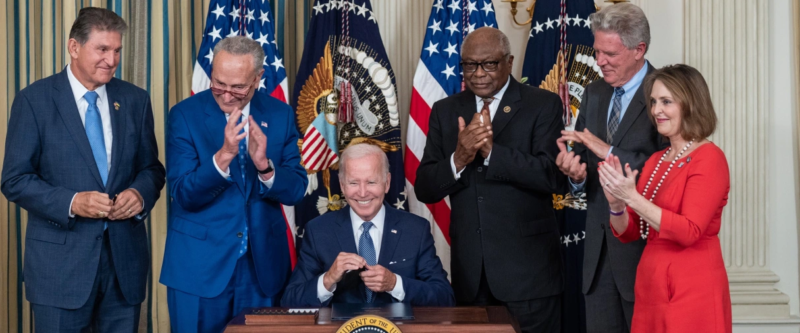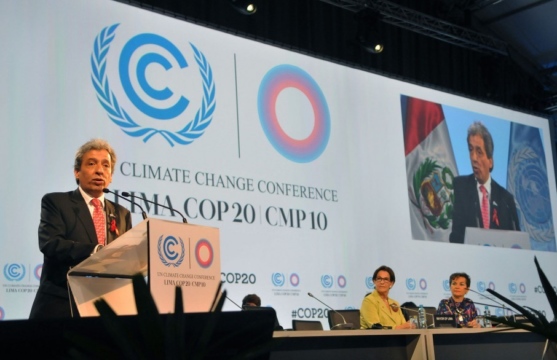Bolivia & the Global Fight Against Climate Change
In the past year, the Bolivian government has emerged as an outspoken critic of climate change policies.
A Daily Publication of The Dialogue
U.S. President Joe Biden on Aug. 16 signed into law the Inflation Reduction Act, which includes $369 billion for climate action, the largest investment in that area in U.S. history. The measure is set to cut the United States’ greenhouse gas emissions by 40 percent by 2030, according to the legislation’s authors. What are the key climate provisions in the Inflation Reduction Act, and how do they compare to climate-related legislation in Latin America and the Caribbean? How might decarbonization efforts and clean energy incentives affect U.S. trade relations and partnerships in the region?
José Goldemberg, former Brazilian environment minister and minister of science and technology: “The key climate related provisions of the Inflation Reduction Act are tax credits for ‘clean electricity’ ($176.8 billion), ‘clean manufacturing’ ($42.7 billion) and ‘clean vehicles’ ($38.9 billion), which total $258.5 billion, roughly 70 percent of the total. The other provisions are scattered over a number of other activities, such pollution reductions in poor communities. The act is entirely directed to activities in the United States, but it will influence the policies of countries in Latin America and the Caribbean (LAC), which will benefit from the technological advances resulting from heavy investments in clean fuels, vehicles and clean electricity. This will result in an increase in sales for U.S. companies. Of particular interest to LAC countries are ‘clean fuels’ for which $8.6 billion in tax credits are in the act. Brazil is well advanced in this area, and partnerships would be welcome. Another area of great interest is ‘conservation, rural development and forestry’ (including restoration) for which $34.7 billion is allocated as funding. Deforestation in the Amazon basin (particularly in Brazil) is the most pressing environmental problem that Brazil is facing. Cooperation in this area would be highly desirable. The Inflation Reduction Act will certainly reinvigorate the world’s efforts to reduce carbon emissions and will encourage other countries, particularly LAC countries, to adopt legislation formulated along similar lines.”
Leila Salazar-López, executive director of Amazon Watch: “While the Inflation Reduction Act commits the largest investment of climate action funds in U.S. history—including renewable energy infrastructure, jobs and health care—it also continues to subsidize the fossil fuel industry and promote false solutions, like carbon offsets, putting our climate and frontline communities at risk. Commitments to reduce greenhouse gas emissions by investing in renewables without stopping fossil fuel expansion plans and investments will not stop the climate emergency we are facing. In fact, they may offset and increase emissions in the United States, the rest of the Americas and globally as fossil fuels and mining projects are fast-tracked without the free, prior and informed consent of local communities. We need President Biden to declare a climate emergency and stop subsidizing the fossil fuel industry. For decades, communities from the Arctic to the Amazon, have been defending their rights and territories from the extractive industries and calling on governments, corporations and banks to keep fossil fuels in the ground and support a just transition to renewable energy. Considering the emergencies facing the Amazon and the global climate, we need to support the boldest and most ambitious commitments, including the call by Indigenous and forest peoples to protect 80 percent of the Amazon by 2025 to avert climate chaos. With new leadership in countries across the Americas, including in Colombia and Chile, there is hope for even stronger climate-related legislation in the region.”
MK Vereen, program assistant, and Nate Graham, former program manager, both of the Energy, Climate Change & Extractive Industries program at the Inter-American Dialogue: “Using a ‘carrot over stick’ approach, the bill’s main climate provisions are a set of large-scale tax incentives and spending measures for clean energy technology. Other measures include fees for methane flaring and support for climate-smart agriculture. With the IRA, the United States finally establishes credibility for the Biden administration’s climate diplomacy efforts and puts itself at the leading edge of a hemisphere with highly uneven climate policies. On the one hand, some Latin American countries are also implementing policies mirrored in the IRA. For instance, Colombia also offers a range of tax incentives for renewable energy and electric vehicles (EVs) and recently regulated methane flaring. Brazil leads in distributed solar generation. Chile is working rapidly to retire coal plants and passed a key energy efficiency law last year. On the other hand, the bill clearly sets the United States apart from Mexico, whose government is doubling down on dirty fuels. Many other countries in the region, despite having emissions reduction goals, lack the fiscal or institutional capacity to implement such a diverse and wide-reaching set of schemes. In terms of trade, the IRA prioritizes U.S. manufacturers, but it could also yield certain benefits for the region. For instance, access to EV tax credits depends on final assembly of vehicles in North America, which could benefit Mexican automakers, and stipulations related to the sources of critical minerals privilege countries with which the United States has a free-trade agreement (such as Chile, which has large lithium reserves). U.S. investments in energy and agricultural research and innovation could also benefit the region, enhancing its competitiveness, accelerating its energy transition and bolstering its climate resilience, if steps are taken to transfer this knowledge and facilitate greater trade integration in areas like energy technology and climate-smart agricultural products.”
Diana Chavez, executive director of the Private Sector Regional Center for the Support of U.N. Sustainable Development Goals: “The U.S. Inflation Reduction Act (IRA), has been described by Joseph Stiglitz as ‘a landmark legislative achievement.’ The act aims to address rising energy costs and catalyze clean energy transition for the world’s second-largest carbon dioxide emitter. It provides tax incentives for investments in green energy, electric vehicles and nuclear power production. Moreover, the act proposes a roadmap to reduce the country’s carbon dioxide emissions to 60 percent of 2005 levels by 2035. A controversial aspect of the IRA is the provision that allows oil and gas drilling expansion; most Latin American countries also permit this. The IRA and climate-related legislation in Latin America and the Caribbean share the common elements of achieving the Paris Agreement pledges and promoting energy security. Latin America’s approach to emissions reduction is more heavily weighted to regulation, with less emphasis on incentives. This is in part due to limited public financial resources to implement a timelier transition to decarbonization. The IRA’s $369 billion investment in climate solutions equals 11.95 percent of the GDP of South America. The United States continues to be the major foreign investor in Latin America. Recalibration of the proposed climate architecture may be required to accommodate trade scenarios and multi-stakeholder commitments. The 2030 agenda and environmental, social and governance strategies need to be part of the climate and finance conversation. Requirements for more detailed disclosure of climate risks are already being studied by the Securities and Exchange Commission. Reliable data is essential for a consistent set of climate disclosure standards and to further improve decision-making. The IRA challenges the United States and Latin America to find the balance between economic competitiveness and environmental sustainability.”
 The Latin America Advisor features Q&A from leaders in politics, economics, and finance every business day. It is available to members of the Dialogue’s Corporate Program and others by subscription.
The Latin America Advisor features Q&A from leaders in politics, economics, and finance every business day. It is available to members of the Dialogue’s Corporate Program and others by subscription.
In the past year, the Bolivian government has emerged as an outspoken critic of climate change policies.
As global temperatures continue to rise with the global community stalled on any way to stop them, countries must prepare to adapt to increasingly volatile environmental conditions.
In December, world leaders will travel to Lima, Peru to participate in United Nations COP 20 talks.
 U.S. President Joe Biden on Aug. 16 signed the Inflation Reduction Act, which includes $369 billion for action on climate goals. // Photo: White House.
U.S. President Joe Biden on Aug. 16 signed the Inflation Reduction Act, which includes $369 billion for action on climate goals. // Photo: White House.
